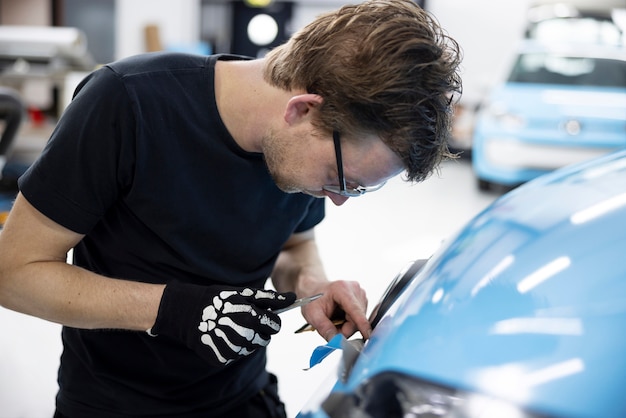Launching Your Own Auto Body Shop: A Comprehensive Guide

Are you tired of working at someone else’s auto body shop, or maybe you’re just a hobbyist wanting to turn your car repair skills into something more lucrative? With a typical gross margin of 20-40% for parts and 50-60% for labor, starting your own shop can be a profitable venture. But do you know what it takes to set up your own auto body business?
If you’re not sure, don’t worry. Here’s a straightforward guide to help you get your shop off the ground:
Create a Business Plan:
Before opening your auto body shop, you need a solid plan. Crafting a business plan might not be the most thrilling task, but it will help you clearly understand everything you need to do to open and run your business smoothly. Outline your goals, analyze the market, estimate your earnings, identify local competitors, and determine the type of funding you’ll need. This plan will serve as your roadmap, helping you secure finances and find a location.
Need help putting together your business plan? The U.S. Small Business Administration offers a useful tool to guide you through the process.
Pick the Perfect Location:
Location is crucial for an auto body shop. You need to choose a spot that’s affordable, spacious enough to accommodate your operations (with room for growth), and easily accessible to potential customers. Avoid places that are hard to find or get to, as they won’t be clients’ first choice. If renting, carefully review any conditions attached to the lease to prevent future disruptions.
Select the Right Equipment:
Getting the right equipment is a big part of your start-up costs, so it’s vital to know what’s essential and what’s a luxury. You’ll likely need a compressor, a spray gun, different spray paints for customers to choose from, and tools for body repairs like sanders and hammers. Before making any purchases, get a range of quotes to fully understand the costs, which will guide you in the financing stage.
Financing and Funding:
Starting a business in the automotive field requires money. You need a workspace, equipment, insurance, and enough funds for parts and salaries. Check whether you can cover some of these costs yourself. If not, consider applying for a Small Business Administration (SBA) loan. These loans are federally backed and offer low-interest rates to help you get started. If a loan isn’t an option for you, explore other ways to raise business capital.
Consider Franchising:
Not sure about going solo, or worried about tough competition in your area? Franchising might be a better option for you. Joining a franchise means aligning with an established brand, benefiting from their marketing, brand reputation, and support in exchange for a cut of your profits. You’ll also gain from their experience, as most large franchises offer a clear startup plan, reducing uncertainty and the risk of failure.
Choose a Marketing Strategy:
You can’t succeed without knowing how to attract customers. Investing in marketing from the beginning is key, especially if you want to start generating profits quickly. Customers need to trust your business, and your website is usually their first impression. Make sure it’s high-quality to draw in clients effectively. Explore different marketing ideas to make your shop well known.
Final Preparations:
With your business plan, finances, and a potential location set, it’s time for the final steps before you launch. Are you satisfied with your business name? Get it registered and check if there’s enough left in your marketing budget for branding. If you need staff, start the hiring process by advertising and interviewing candidates. Also, make sure to register your business with the DMV if required by local laws.
Before opening, ensure you comply with state and federal regulations regarding hazardous materials like paint. Your shop should have proper ventilation and established health and safety procedures. For safety regulations, check out the Occupational Safety and Health Administration’s guidelines for auto repair shops.
Start Your Auto Body Shop Today:
With promising profit margins, there’s never been a better time to start your own auto body shop. But don’t rush in without a plan. Develop your strategy, study your competitors, and discuss financing options with lenders. Before you open, ensure your shop is safe for you, your customers, and your employees. Once up and running, remember to steer clear of common business pitfalls. Have any tips of your own? Share them!
Share this content:


